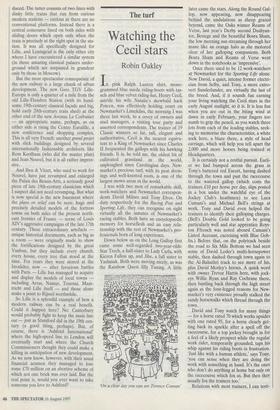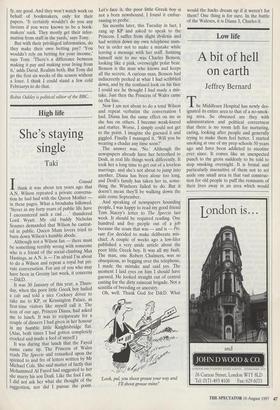The turf
Watching the Cecil stars
Robin Oakley
In pink Ralph Lauren shirt, mono- grammed blue suede riding-boots with tas- sels and blue velvet riding-hat, Henry Cecil, astride his wife Natalie's skewbald hack Poteen, was effectively holding court on Newmarket's Limekilns, the morning I was there last week, to a covey of owners and stud managers, a visiting tour party and assorted correspondents. The trainer of 19 Classic winners so far, tall, elegant and authoritative, Cecil is the nearest equiva- lent to a King of Newmarket since Charles II frequented the gallops with his hawking friends. It is, he told me, the oldest bit of cultivated grassland in the world, unploughed since Carolingian days. New- market's precious turf, with its peat dress- ings and well-knotted roots, is one of the largest mown areas in the world.
I was with two men of remarkable skill, work-watchers and Newmarket correspon- dents David Milnes and Tony Elves. On duty respectively for the Racing Post and Sporting Life, they can recognise on sight virtually all the inmates of Newmarket's racing stables. Both have an encyclopaedic memory for horseflesh and an easy rela- tionship with the rest of Newmarket's pro- fessionals born of long experience.
Down below us on the Long Gallop first came some well-regarded two-year-olds: Star Trech, a half-sister to Lady Carla, with Kieren Fallon up, and Jibe, a full sister to Yashmak. Both were moving nicely, as was the Rainbow Quest filly Tuning. A little `On a clear day you can see Terence Conran' later came the stars. Along the Round Gal- lop, now appearing, now disappearing behind the undulations as sheep grazed beyond, came the Oaks winner Reams of Verse, last year's Derby second Dushyan- tor, Besiege and the beautiful Bosra Sham, the low morning sun streaming through her mane like an orange halo as she motored clear of her galloping companions. Both Bosra Sham and Reams of Verse went down in the notebooks as 'impressive'.
Once there used to be 12 work-watchers at Newmarket for the Sporting Life alone. Now David, a quiet, intense former electri- cian from Selby, and Tony, a more extro- vert Sunderlander, are virtually the last of the breed. And, if it sounds fun earning your living watching the Cecil stars in the early August sunlight, so it is. It is less fun when you are out in the biting wind at dawn in early February, your fingers too numb to grip the pencil, as you watch three lots from each of the leading stables, seek- ing to memorise the characteristics, a white sock here, a blaze there, a style of head carriage, which will help you tell apart the 2,000 and more horses being trained at Headquarters.
It is certainly not a restful pursuit. Earli- er we had bumped across the grass in Tony's battered red Escort, having dashed through the town and past the racecourse to the watered gallop (which costs the trainers £10 per horse per day, slips posted in a box under the watchful eye of the Jockey Club's heathmen) to see Luca Cumani's and Michael Bell's strings at work. Tony and David even helped the trainers to identify their galloping charges. (Bell's Double Gold looked to be going particularly well and star apprentice Roys- ton Ffrench was noted aboard Cumani's Listed Account, exercising with Blue Gob- lin.) Before that, on the polytrack beside the road to Six Mile Bottom we had seen some of David Loder's multi-horsepower stable, then dashed through town again to the Al-Bahathri track to see more of his, plus David Morley's horses. A quick word with owner Trevor Harris here, with jock- eys Willie Ryan and Ray Cochrane there, then bustling back through the high street again as the four-legged reasons for New- market's very existence proudly stalked the sandy horsewalks which thread through the town.
David and Tony watch for many things — for a horse rated 70 which works upsides with one rated 95, for a horse clearly get- ting back its sparkle after a spell off the racecourse, for a top jockey brought in for a feel of a likely prospect while the regular work rider, temporarily grounded, taps his whip against his riding boots in frustration. `Just like with a human athlete,' says Tony, `you can sense when they are doing the work with something in hand. It's the ones who don't do anything at home but only on the racecourse which fox us. But then they usually fox the trainers too.'
Relations with most trainers, I can testi- fy, are good. And they won't watch work on behalf of bookmakers, only for their papers. 'It certainly wouldn't do you any favours if you were known to be a book- makers' nark. They mostly get their infor- mation from staff in the yards,' says Tony.
But with their privileged information, do they make their own betting pay? 'You wouldn't rely on betting for your income,' says Tony. 'There's a difference between making it pay and making your living from it,' adds David. Realists both. But Tony did go the first six weeks of the season without a loser. I think I could stand a few cold Februarys to do that.
Robin Oakley is political editor of the BBC.



























































 Previous page
Previous page